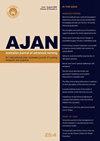澳大利亚护理教育工作者对护理学生护理老年人口腔健康的准备工作的看法
IF 1.3
4区 医学
Q3 NURSING
引用次数: 1
摘要
护士可以而且需要在社区、医院和寄宿护理环境中发挥领导作用,改善和维护澳大利亚老年人的口腔健康。[…]重要的是调查护理教育工作者对护理学生护理老年人口腔健康的准备工作的看法。关键词:老年护理、口腔健康、护理、老年人、护理课程、牙科护理、跨专业和合作实践引言尽管人们越来越了解口腔健康的重要性及其与一般健康的关系,但许多澳大利亚老年人(65岁及以上)的口腔健康仍然很差,口腔疾病会加重心脏问题、糖尿病和肺炎,导致意外住院。3“5口腔健康不良也会增加病毒感染并发症的严重程度,包括COVID-19。67老年人的主要口腔健康问题包括蛀牙、牙龈疾病、口干、牙齿磨损和口腔癌症口腔外观。9保持口腔健康——一个没有疼痛、不适和疾病的口腔——是保持老年人生活质量和总体健康的关键。10在提供口腔保健时,护士需要了解影响人们口腔健康和口腔健康相关生活质量的因素,确保日常口腔护理实践,并且能够完成口腔健康筛查以识别需要及时转诊给牙医、医生或其他人的问题,11澳大利亚政府资助的学习资源包促进了老年人的口腔保健,如“改善住院护理中的口腔健康”和“改善家庭护理中的口服健康”。12这些资源是十年前开发的,旨在教育和帮助护士、护理助理,12然而,这些学习资源包的使用似乎有限,皇家老年护理质量与安全委员会的报告强调了对老年人口腔健康的持续忽视,13澳大利亚的医院也对老年人的口腔保健提出了类似的担忧。14随着人们年龄的增长,许多人变得虚弱,需要口腔护理的帮助。国际报告和研究承认护士在提供口腔保健方面的重要性。15-18 COVID-19大流行期间对牙科服务的限制突出了护士在口腔保健方面发挥领导作用的必要性,19护理课程需要规定有效提供口腔保健的知识和临床能力要求,以确保所有毕业学生都做好了提供此类护理的充分准备。11尽管公认口腔健康不佳与一般健康之间存在关联,13,20-22对澳大利亚护理专业学生为老年人提供口腔保健的准备程度知之甚少。11大学网站上发布的澳大利亚护理学士课程综述,第一作者(VB)没有显示任何关于纳入老年人口腔健康护理单位和临床实践的信息。目前的澳大利亚护理和助产认证委员会(ANMAC)标准可能暗示了口腔保健方面的能力(标准3.6确实要求护理项目在内容和学习结果方面结合跨专业学习和实践的原则),但没有特别关注口腔保健学习目标本研究旨在评估护理教育工作者对护理学生了解和提供有效口腔保健的准备工作的看法,尤其是对老年人。本文章由计算机程序翻译,如有差异,请以英文原文为准。
Perspectives of Australian nursing educators on the preparation of nursing students for the care of older people's oral health
Nurses can and need to take a leadership role in improving and maintaining older Australians' oral health in community, hospital, and residential care settings. [...]it is important to investigate the perspectives of nursing educators on the preparation of nursing students for the care of older people's oral health. Keywords: aged care, oral health, nursing, older people, nursing curricula, dental care, interprofessional and collaborative practice INTRODUCTION The oral health of many older Australians (65 years and above) remains poor despite an increased understanding of the importance of oral health and its association with general healths 2 Due to blood-borne pathogens from the mouth, oral diseases worsen heart problems, diabetes, and pneumonia, leading to unplanned hospitalisations.3"5 Poor oral health also increases the severity of complications arising from viral infections, including COVID-19.6,7 Predominant oral health issues for older people include tooth decay, gum diseases, dry mouth, tooth wear, and oral cancer.8 Poor oral health leads to oral pain, difficulties in eating, speaking, and swallowing as well as lower self-esteem due to bad breath and poor facial and dental appearance.9 Maintaining oral health - a mouth free of pain, discomfort and disease - is key to maintaining the quality of life and general health of older people.10 In providing oral healthcare, nurses need to understand the factors affecting people's oral health and oral healthrelated quality of life, ensure daily oral care practice, and be able to complete an oral health screening to identify issues needing timely referral to a dentist, doctor, or allied health specialist.11 Oral healthcare for older people has been promoted by Australian government-funded learning resource packages such as "Better Oral Health in Residential Care" and "Better Oral Health in Home Care".12 These resources were developed a decade ago to educate and assist nurses, nursing assistants, and allied health professionals to collaborate with dental professionals to ensure effective oral healthcare for the older population.12 However, the uptake of these learning resource packages appears limited, and the report of the Royal Commission into Aged Care Quality and Safety highlighted the continuing neglect of older people's oral health, particularly in residential care.13 Similar concerns have been raised about the oral healthcare of older people in hospitals in Australia.14 As people age, many become frail and require assistance with oral care. The importance of nurses in providing oral healthcare has been acknowledged in international reports and studies.15-18 Restrictions to dental services during the COVID -19 pandemic have highlighted the need for the leadership of nurses in oral healthcare, working closely with dentists, doctors, and allied health professionals to maintain older adults' oral and general health.19 Nursing curricula need to specify the knowledge and clinical competence requirements for the effective provision of oral healthcare to ensure that all graduating students are well-prepared to provide such care.11 Despite the acknowledged association between poor oral health and general health, 13, 20-22 there is little known about the extent of the preparation of nursing students in Australia to provide oral healthcare for older people.11 A review of the curricula of Australian Bachelor of Nursing programs, as presented on university websites, by the first author (VB) showed no information regarding the inclusion of units and clinical practice addressing the care of older people's oral health. Competence in oral healthcare may be implied in current Australian Nursing and Midwifery Accreditation Council (ANMAC) Standards (Standard 3.6 does require nursing programs to integrate principles of interprofessional learning and practice in content and learning outcomes) but there is no particular focus on oral healthcare learning objectives.23 To address this apparent lack of focus on oral healthcare, this study aimed to assess the perceptions of nursing educators regarding the preparation of nursing students to understand and provide effective oral healthcare, particularly for older people.
求助全文
通过发布文献求助,成功后即可免费获取论文全文。
去求助
来源期刊
CiteScore
2.30
自引率
7.10%
发文量
27
审稿时长
>12 weeks
期刊介绍:
The Australian Journal of Advanced Nursing publishes a wide variety of original research, review articles, practice guidelines, and commentary relevant to nursing and midwifery practice, health- maternity- and aged- care delivery, public health, healthcare policy and funding, nursing and midwifery education, regulation, management, economics, ethics, and research methodology. Further, the journal publishes personal narratives that convey the art and spirit of nursing and midwifery.
As the official peer-reviewed journal of the ANMF, AJAN is dedicated to publishing and showcasing scholarly material of principal relevance to national nursing and midwifery professional, clinical, research, education, management, and policy audiences. Beyond AJAN’s primarily national focus, manuscripts with regional and international scope are also welcome where their contribution to knowledge and debate on key issues for nursing, midwifery, and healthcare more broadly are significant.

 求助内容:
求助内容: 应助结果提醒方式:
应助结果提醒方式:


